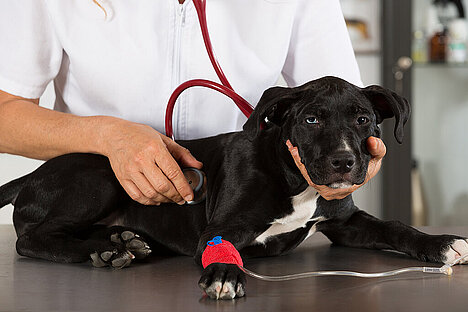Bronchitis

Bronchitis is an inflammation of the airways that can lead to coughing, shortness of breath and fever. It can occur both acutely and chronically and can have various causes. In this article, you will learn how to recognize, treat and prevent bronchitis in your dog.
What is bronchitis?
The bronchi are the branches of the windpipe that transport air into the lungs. If they are inflamed, this is called bronchitis. The inflammation can be triggered by various factors, for example viruses, bacteria, allergies or foreign bodies. Bronchitis can be acute or chronic, depending on how long it lasts and how often it occurs.
Acute bronchitis
Acute bronchitis is a short-term inflammation of the bronchial tubes, usually caused by an infection. It often occurs in connection with a cold or other respiratory illness. The symptoms are usually cough, sputum, fever and shortness of breath. Acute bronchitis usually heals on its own within a few weeks, but can also lead to pneumonia if left untreated.
Chronic bronchitis
Chronic bronchitis is a long-term inflammation of the bronchial tubes that leads to permanent damage to the airways. It is often caused by a repeated or persistent infection, but can also be triggered by other factors such as allergies, pollution or smoking. Symptoms include a persistent cough with sputum production, shortness of breath and fatigue. Chronic bronchitis can lead to a reduced quality of life and serious complications such as heart failure or emphysema.
How do I recognize bronchitis in my dog?
The most common signs of bronchitis in dogs are coughing and shortness of breath. The cough can be dry or wet, depending on whether mucus is being produced or not. The cough can also be aggravated by exertion, excitement or pressure on the throat. Shortness of breath may manifest itself in accelerated or shallow breathing, especially during physical activity. Other possible symptoms include fever, loss of appetite, weight loss and lethargy.
To make an accurate diagnosis, you should take your dog to the vet if you notice these symptoms. The vet will perform a physical examination and may order further tests, such as a blood test, chest X-ray or bronchoscopy. These tests can help determine the cause and severity of the bronchitis and rule out other conditions.
How do I treat bronchitis in my dog?
The treatment of bronchitis in dogs depends on the cause and severity of the disease. In many cases, it is sufficient to rest the dog and offer him plenty of water. If the bronchitis is caused by a bacterial infection, the vet may prescribe antibiotics. If the bronchitis is caused by an allergic reaction, the vet may prescribe antihistamines or corticosteroids. If the bronchitis is caused by a foreign body, the vet may remove it under anesthesia.
In the case of chronic bronchitis, it may be necessary to treat the dog regularly with medication to reduce the inflammation and make breathing easier. This may include inhalers or nebulizers, for example. You should also try to avoid or minimize the triggers for bronchitis, such as smoke, dust or pollen. A healthy diet and moderate exercise can also help to strengthen the immune system and improve lung function.
How can I prevent bronchitis in my dog?
The best way to prevent bronchitis in dogs is to promote your dog's health and well-being. This includes:
- Regularly vaccinating your dog against respiratory diseases such as kennel cough or parainfluenza.
- Regularly worming your dog to prevent parasites such as heartworm or lungworm.
- Avoiding contact with sick or infected dogs, especially in shelters or boarding kennels.
- Avoiding stress factors for your dog, such as noise, heat or cold.
- Avoiding smoke, dust or other irritants in your dog's environment.
- Providing fresh water and a balanced diet for your dog.
- Promoting appropriate exercise and a healthy weight for your dog.
Bronchitis is a common disease in dogs that can lead to coughing, shortness of breath and fever. It can be both acute and chronic and can have various causes. If you notice signs of bronchitis in your dog, you should take him to the vet to get a diagnosis and treatment. You can also take some measures to prevent or alleviate bronchitis in your dog, such as vaccinating, deworming, avoiding irritants and promoting a healthy lifestyle.
The authors assume that a veterinarian should be consulted if an animal is ill and that medication should only be taken after consultation with a doctor or pharmacist. Only an individual examination can lead to a diagnosis and treatment decision.
We help you find the nearest vet → This way